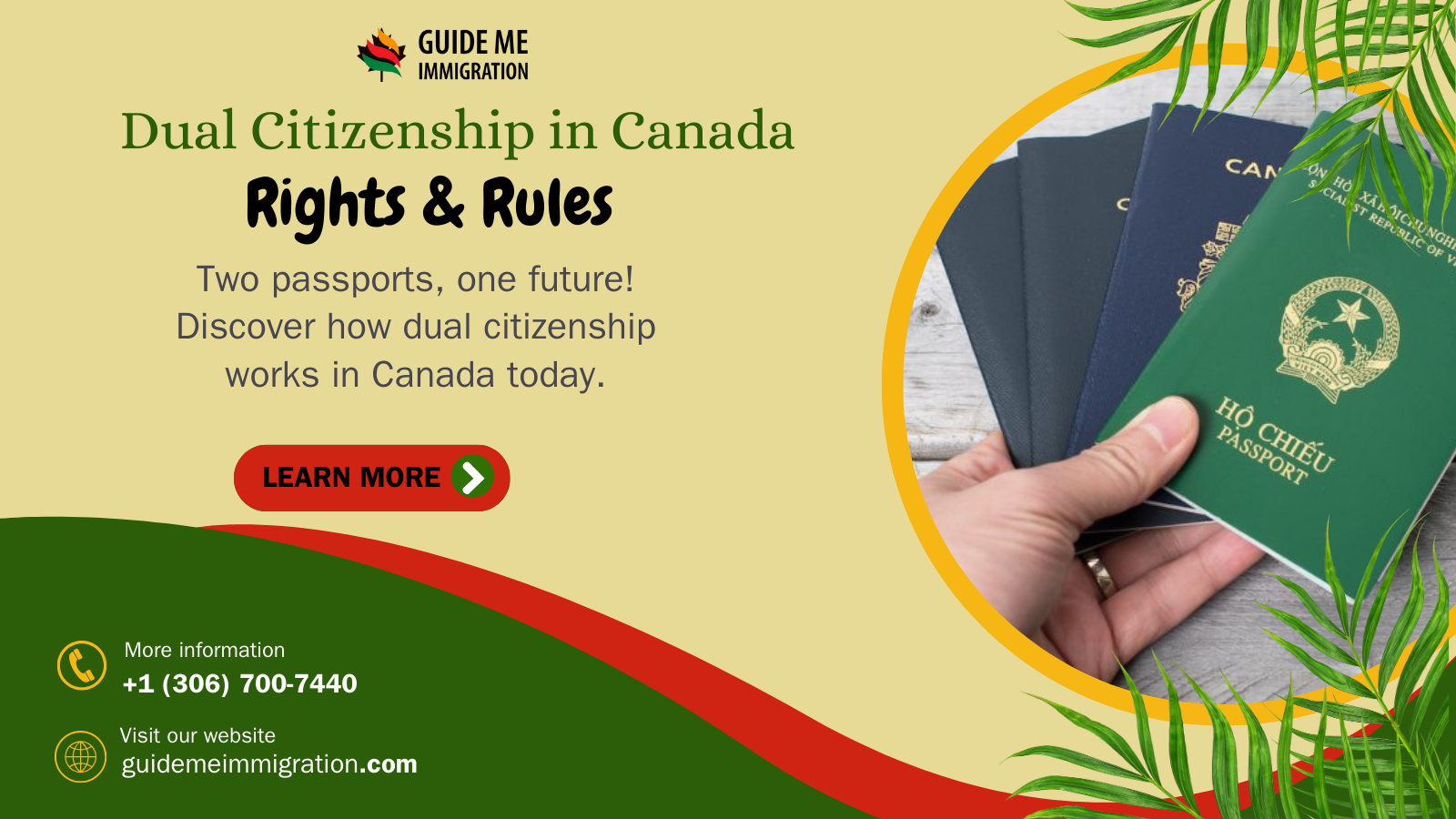Can You Be a Dual Citizen if You Immigrate to Canada? Everything You Need to Know
Immigrating to Canada is an exciting journey filled with opportunities for a better life. For many, one of the big questions is whether Canada allows dual citizenship. The answer is yes, and this possibility can significantly enhance your migration experience. In this comprehensive guide, we’ll explore everything about dual citizenship, including its benefits, legal considerations, and how to navigate the process effectively.
Table of Contents
- What Is Dual Citizenship?
- Canada’s Approach to Dual Citizenship
- Benefits of Dual Citizenship in Canada
- Understanding Your Home Country’s Policies
- Eligibility for Canadian Citizenship
- The Path to Dual Citizenship
- Common Challenges and How to Overcome Them
- FAQs About Dual Citizenship in Canada
- How Guide Me Immigration Can Help
1. What Is Dual Citizenship?
Dual citizenship means being a legal citizen of two countries at the same time. As a dual citizen, you hold two passports and enjoy the rights and responsibilities of both nations. However, the rules surrounding dual citizenship vary depending on each country’s laws.
For instance, while Canada allows dual citizenship, some countries require you to renounce your original citizenship when acquiring a new one. Understanding the legal framework is key before proceeding.
2. Canada’s Approach to Dual Citizenship
Canada has a progressive stance on dual citizenship. Since 1977, the Canadian government has allowed individuals to acquire Canadian citizenship without renouncing their original nationality. This flexibility is one of the reasons Canada is a popular destination for immigrants worldwide.
However, your ability to hold dual citizenship also depends on your home country. Some nations, such as India and China, do not permit dual citizenship, while others, like the United States and the United Kingdom, do.
3. Benefits of Dual Citizenship in Canada
Dual citizenship comes with numerous advantages, making it a valuable status for those who qualify.
A. Access to Canadian Benefits
As a Canadian citizen, you gain access to:
- Universal Healthcare: Benefit from Canada’s publicly funded healthcare system.
- Social Programs: Access programs like pensions, unemployment insurance, and child benefits.
- Educational Opportunities: Enjoy lower tuition fees for Canadian universities and colleges.
B. Travel Freedom
A Canadian passport ranks among the strongest globally, offering visa-free or visa-on-arrival access to over 185 countries. This mobility is especially beneficial for business, leisure, or family visits.
C. Retaining Your Heritage
Dual citizenship allows you to maintain strong ties with your home country, preserving your cultural identity and family connections while enjoying life in Canada.
4. Understanding Your Home Country’s Policies
While Canada allows dual citizenship, it’s crucial to check your home country’s laws. Here’s a breakdown:
- Countries That Allow Dual Citizenship: United States, United Kingdom, Australia, and many European nations.
- Countries That Restrict Dual Citizenship: India, China, and Japan, among others, may not recognize or permit dual citizenship.
If your home country doesn’t allow dual citizenship, you may face challenges like losing your original citizenship upon becoming Canadian.
5. Eligibility for Canadian Citizenship
Before pursuing dual citizenship, you must first qualify for Canadian citizenship. The main eligibility criteria include:
- Permanent Residency: You must hold permanent resident (PR) status in Canada.
- Physical Presence: You need to have lived in Canada for at least 1,095 days (three years) out of the last five years.
- Language Proficiency: Demonstrate basic knowledge of English or French.
- No Criminal Record: Ensure a clean legal record.
6. The Path to Dual Citizenship
A. Becoming a Permanent Resident
Your journey starts with acquiring permanent residency through pathways like Express Entry, Provincial Nominee Programs (PNPs), or family sponsorship.
B. Meeting Citizenship Requirements
As a PR, fulfill the eligibility criteria, including the physical presence requirement and filing taxes in Canada for at least three years.
C. Applying for Canadian Citizenship
Submit your citizenship application along with supporting documents, pay the required fees, and pass the citizenship test and interview.
D. Swearing the Oath of Citizenship
Once approved, attend a citizenship ceremony where you’ll take the Oath of Citizenship and officially become a Canadian citizen.
7. Common Challenges and How to Overcome Them
A. Home Country Restrictions
If your home country doesn’t allow dual citizenship, consider these options:
- Explore “Overseas Citizenship” or similar programs, if available.
- Consult with legal experts to understand the implications.
B. Meeting Physical Presence Requirements
Track your days in Canada using tools like the Physical Presence Calculator on the IRCC website.
C. Navigating Complex Paperwork
Ensure your documents are complete and accurate to avoid delays. Seeking professional guidance can help.
8. FAQs About Dual Citizenship in Canada
Q1: Can I lose Canadian citizenship if my home country doesn’t allow dual citizenship?
No, Canada does not revoke citizenship based on another country’s policies. However, your home country may choose to revoke your original citizenship.
Q2: Do dual citizens pay taxes in both countries?
Tax obligations depend on treaties between Canada and your home country. Some countries have agreements to prevent double taxation.
Q3: Is dual citizenship automatic for children born in Canada to foreign parents?
Children born in Canada automatically gain Canadian citizenship. If your home country allows dual citizenship, they may hold both.
9. How Guide Me Immigration Can Help
Navigating the path to dual citizenship can be complex, but you don’t have to do it alone. At Guide Me Immigration, we specialize in simplifying the process for you.
Why Choose Us?
- Expertise in Canadian immigration laws.
- Personalized guidance tailored to your unique situation.
- Offices conveniently located in Saskatoon and Regina for in-person consultations.
Contact Us Today!
📍 Saskatoon Office: 535 20th St West, Saskatoon, SK S7M 0X6 (Unit-C)
📍 Regina Office: Unit 170 – 2410 Dewdney Ave, Regina, SK S4R 1H6
📞 Call Us: +1 306 700 7440
Dual citizenship opens the door to endless opportunities, allowing you to enjoy the best of two worlds. If you’re ready to start your journey, reach out to Guide Me Immigration, and let us help you achieve your dreams.
Our Website:https://guidemeimmigration.com/
Other Link:http://canesl.ca






